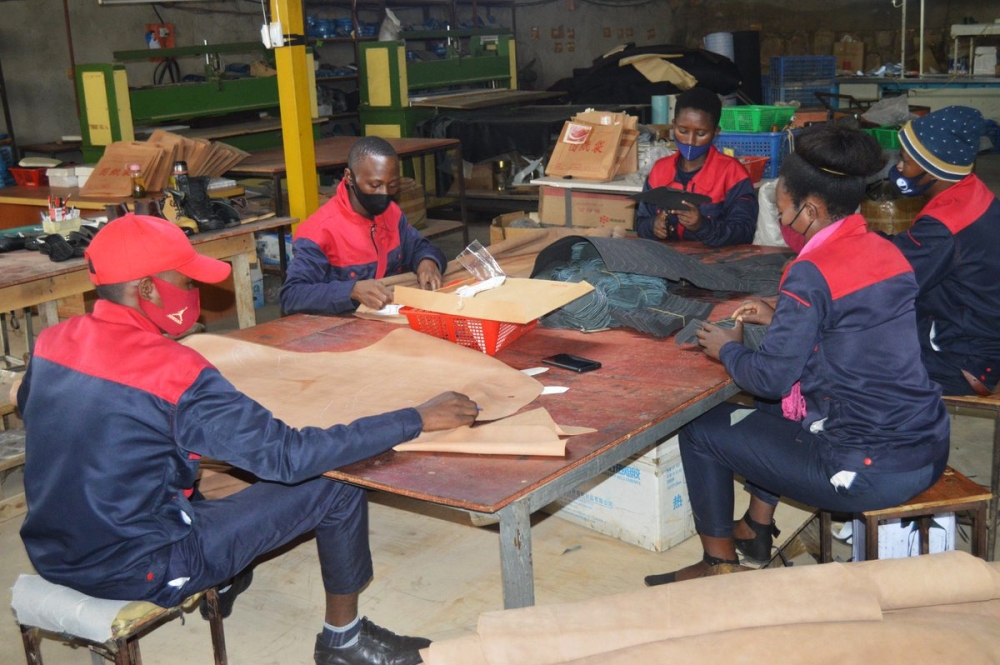

Dealers in hides and skins in Rwanda are seeking help to be able to trade on African Continental Free Trade Area (AfCFTA) given that there is limited market in the East African Community (EAC).
The industry defines hides as "skins" of large animals such as cows while skins refer to "skins" of smaller animals such as goats, sheep, deer, pigs, among others.
ALSO READ: Tannery park to be set up in Bugesera to boost leather sector
The AfCFTA which dealers need for these hides and skins is the largest free trade pact in the world in terms of the number of signatories, which promises to turn Africa into a modern, industrialised, cohesive, and influential player on the global stage.
ALSO READ: Private sector urged to expand market under AfCFTA trading
It seeks to create an integrated market for the trade in goods and services, as well as the free movement of people and capital.


Members are initially required to remove tariffs from 90% of goods per AfCFTA Tariff Modalities , eventually allowing free access to at least 97% of goods and most of services across the African continent.
Jean D&039;Amour Kamayirese, the representative of Kigali Leather Cluster which brings together more than 3,000 dealers in hides and skins in Rwanda, says there are currently more than 100 tonnes of hides and skins in stores that are rotting away due to lack of market in the EAC market.
"There is a rule which says that we should not trade in skins outside the EAC market yet they can't buy all the hides and skins we have because the market is too small yet we have buyers from other African countries, Italy, and others interested in our hides and skins because of their quality. When we try to trade outside the EAC market, we are charged 80 per cent tax. we need a greenlight to trade in other countries under the African Continental Free Trade Area and the rest of the world," he said.
In October 2022, the AfCFTA Guided Trade Initiative was launched which pilots AfCFTA preferential trade among eight member states (Cameroon, Egypt, Ghana, Kenya, Mauritius, Rwanda, Tanzania and Tunisia) for 96 identified commodities, including ceramic tiles, tea, coffee, processed meat products, corn starch, sugar, pasta, glucose syrup, dried fruits, and sisal fibre, amongst others, in line with the AfCFTA focus on value chain development.
Kamayirese said that due to lack of market for hides and skins, the value has shrunk from Rwf1,500 per Kilogramme of cows' skin in 2015 to between Rwf100 and Rwf200 while that of goat and sheep decreased from Rwf3,000 to between Rwf500 and Rwf600.
Currently, buyers say they can't buy since they have enough in their stores.
The hides and skins keep increasing as meat production increases.
ALSO READ: A look at meat, Rwanda’s emerging export
Rwanda’s target of 215,000 tonnes of meat produced annually was reached by more than 90 per cent in 2023, figures from the Rwanda Agriculture and Animal Resources Development Board (RAB) show.
Up to 35 per cent of the meat produced in the fiscal year 2022/23 was beef, followed by chicken 22 per cent and goat 19 per cent. Pork represented 14 per cent, while rabbit and lamb represented six and five per cent, respectively.
ALSO READ: Gako meat project on course to profitability – MPs told
Rwanda’s meat exports more than doubled, reaching $22.3 million in the fiscal year 2022/2023 from $8.8 million in 2021/2022, according to data from the National Agricultural Export Development Board (NAEB).
"This increase in meat production means we need tannery factories because we export raw hides and skins and import finished hides and skins which is a loss to the country," he said.
Germaine Mukashyaka, an entrepreneur with a company that makes leather products said that these products are expensive due to importing finished hides and skins.
"Since there is no tannery in Rwanda, hides and skins are exported. We as producers of leather products have to import tanned hides and skins at a high price. As a result, we sell our goods at higher prices. The tanned hides and skins are still expensive yet raw hides and skins are sold at giveaway prices ," she said..
Denis Karera, the Deputy Chairperson of East African Business Council (EABC) which is training SMEs including dealers in hides and skins on exporting to AfCFTA market via e-commerce digital platforms said governments should work together to make AFCFTA successful by supporting small enterprises.
"SMEs make over 80 per cent of traders on African continent. They should leverage AfCFTA market. Hides and skins dealers should also be facilitated. In the EAC region we need over 600,000 pairs of shoes every month. Therefore hides and skins dealers should be facilitated to supply this market which needs raw materials. All institutions should meet to discuss the challenges and address them," he said, adding that tannery factories should be increased in EAC countries.
According to the Ministry of Trade and Industry, the issue of a lack of market for hides and skins is being discussed to get a solution by reducing taxes charged when hides and skins are traded outside the EAC market.
Tannery park in offing
The Ministry of Trade and Industry has assured players in the leather value chain that there are plans to have a modern tannery park in Bugesera District to reduce imports of tanned hides and skins and as well as reduce the country’s trade deficit.
The proposed investment for an integrated leather processing plant, complete with effluent treatment facilities, is estimated to require an initial outlay of $15.1 million (approximately Rwf 19.7 billion) according to Fred Mugabe, the Director General in charge of Industry Promotion and Entrepreneurship Development at the Ministry of Trade and Industry.
Rwanda imported tanned hides and skins worth $15.6 million in 2019 an increase from $13 million in 2018 mainly from Kenya, China, Ethiopia, UAE and Tanzania and this could stop once Tannery Park is established.
It said the establishment of a finished leather and modern shoe factory will drastically reduce imports saying imports of new footwear increased $15 million in 2016 to $23 million in 2019.
As part of efforts to cut the country’s footwear import bill, a modern factory able to produce 900,000 footwear such as shoes, boots, and sandals is being constructed in Kigali’s Special Economic Zone.


